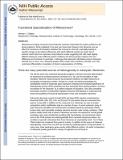Functional specialization of ribosomes?
Author(s)
Gilbert, Wendy
DownloadGilbert_Functional Specialization.pdf (59.44Kb)
PUBLISHER_CC
Publisher with Creative Commons License
Creative Commons Attribution
Terms of use
Metadata
Show full item recordAbstract
Ribosomes are highly conserved macromolecular machines that are responsible for protein synthesis in all living organisms. Work published in the past year has shown that changes to the ribosome core can affect the mechanism of translation initiation that is favored in the cell, which potentially leads to specific changes in the relative efficiencies with which different proteins are made. Here, I examine recent data from expression and proteomic studies that suggest that cells make slightly different ribosomes under different growth conditions, and discuss genetic evidence that such differences are functional. In particular, I argue that eukaryotic cells probably produce ribosomes that lack one or more core ribosomal proteins (RPs) under some conditions, and that core RPs contribute differentially to translation of distinct subpopulations of mRNAs.
Date issued
2011-01Department
Massachusetts Institute of Technology. Department of BiologyJournal
Trends in Biochemical Sciences
Publisher
Elsevier
Citation
Gilbert, Wendy V. “Functional Specialization of Ribosomes?” Trends in Biochemical Sciences 36, no. 3 (March 2011): 127–132.
Version: Author's final manuscript
ISSN
09680004